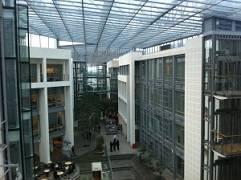October 14, 2013
AHMM chosen for new Met Police headquarters project
The firm of architects chosen for Google’s enormous new North London headquarters project as well as the redevelopment of the BBC’s Television Centre has been chosen to design the new home of the Metropolitan Police in Whitehall. The decision to award the job to Allford Hall Monaghan Morris (AHMM) was announced by the Mayor of London, the Metropolitan Police Commissioner and the Royal Institute of British Architects (RIBA). The Mayor’s Office for Policing And Crime (MOPAC) is selling New Scotland Yard, and moving to modern offices at the iconic Curtis Green building on the Victoria Embankment in 2015. This new building will then revert to being called Scotland Yard.























September 20, 2013
The rehabilitation of the cubicle and other lessons from 100% Design
by Mark Eltringham • Comment, Events, Flexible working, Furniture, Products, Workplace design
UniteSE from KI
As we’ve said before, acoustics has become the dominant theme at office design exhibitions over the past three or four years. That’s been true at shows in Milan, Cologne, Chicago and London and was certainly the case at this year’s 100% Design at Earl’s Court. A quick whizz around the office zone at this year’s event – which is a useful way of getting an impression before you stop to talk to people about the detail of what they’re doing – revealed that well over half of the exhibitors were showcasing products that addressed the issue of acoustics. And yet things have also moved on from recent events, not least in the rehabilitation of that most demonised of all office furniture pieces – the cubicle.
(more…)